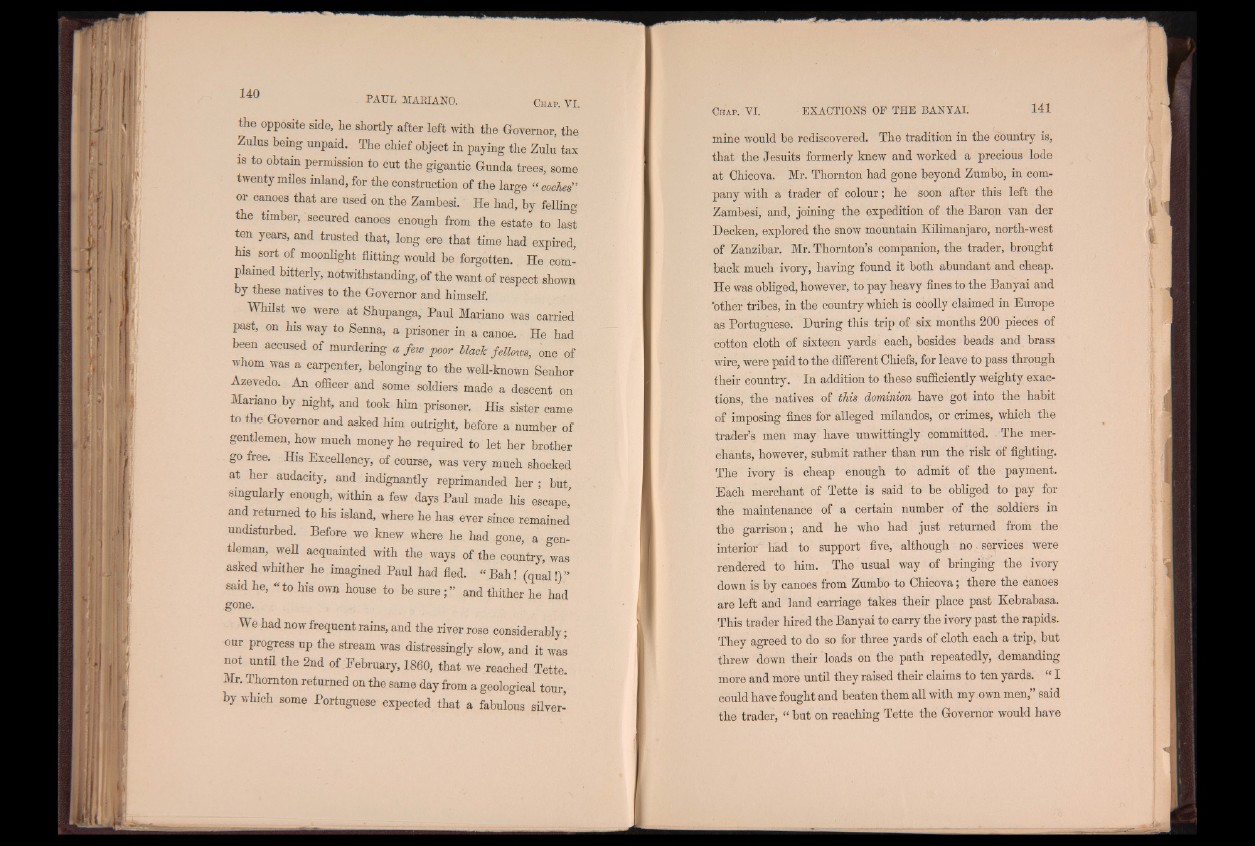
the opposite side, he shortly after left with the Governor, the
Zulus being unpaid. The chief object in paying the Zulu tax
is to obtain permission to cut the gigantic Gunda trees, some
twenty miles inland, for the construction of the large “ codies”
or canoes that are used on the Zambesi. He had, by felling
the timber, secured canoes enough from the estate to last
ten years, and trusted that, long ere that time had expired,
his sort of moonlight flitting would be forgotten. He complained
bitterly, notwithstanding, of the want of respect shown
by these natives to the Governor and himself.
Whilst we were at Shupanga, Paul Mariano was carried
past, on his way to Senna, a prisoner in a canoe. He had
been accused of murdering a few poor black fellows, one of
whom was a carpenter, belonging to tbe well-known Senhor
Azeyedo. An officer and some soldiers'made a descent on
Manano by night, and took him prisoner. His sister came
to the Governor and asked him outright, before a number of
gentlemen, how much money he required to let her brother
go free. His Excellency, of course, was very much shocked
at her audacity, and indignantly reprimanded her ; but
singularly enough, within a few days Paul made his escape,’
and returned to his island, where he has ever since remained
undisturbed. Before we knew where he had gone, a gentleman,
well acquainted with the ways of the country, was
asked whither he imagined Paul had fled. «Bah! (qual!)”
said he, «to his own house to be sure; ” and thither he had
gone.
We had now frequent rains, and the river rose considerably;
our progress up the stream was distressingly slow, and it was
not until the 2nd of February, I860, that we reached Tette.
Mr. Thornton returned on the same day from a geological tour,
by which some Portuguese expected that a fabulous silvermine
would be rediscovered. The tradition in the country is,
that the Jesuits formerly knew and worked a precious lode
at Chicova. Mr. Thornton had gone beyond Zumbo, in company
with a trader of colour; he soon after this left the
Zambesi, and, joining the expedition of the Baron van der
Decken, explored the snow mountain Kilimanjaro, north-west
of Zanzibar. Mr. Thornton’s companion, the trader, brought
back much ivory, having found it both abundant and cheap.
He was obliged, however, to pay heavy fines to the Banyai and
'other tribes, in the country which is coolly claimed in Europe
as Portuguese. During this trip of six months 200 pieces of
cotton cloth of sixteen yards each, besides beads and brass
wire, were paid to tbe different Chiefs, for leave to pass through
their country. In addition to these sufficiently weighty exactions,
the natives of this dominion have got into the habit
of imposing fines for alleged milandos, or crimes, which the
trader’s men may have unwittingly committed. The merchants,
however, submit rather than run the risk of fighting.
The ivory is cheap enough to admit of the payment.
Each merchant of Tette is said to be obliged to pay for
the maintenance of a certain number of the soldiers in
the garrison; and he who had just returned from the
interior had to support five, although no. services were
rendered to him. The usual way of bringing the ivory
down is by canoes from Zumbo to Chicova; there the canoes
are left and land carriage takes their place past Kebrabasa.
This trader hired the Banyai to carry the ivory past the rapids.
They agreed to do so for three yards of cloth each a trip, but
threw down their loads on the path repeatedly, demanding
more and more until they raised their claims to ten yards. ( I
could have fought and beaten them all with my own men,” said
the trader, “ but on reaching Tette the Governor would have